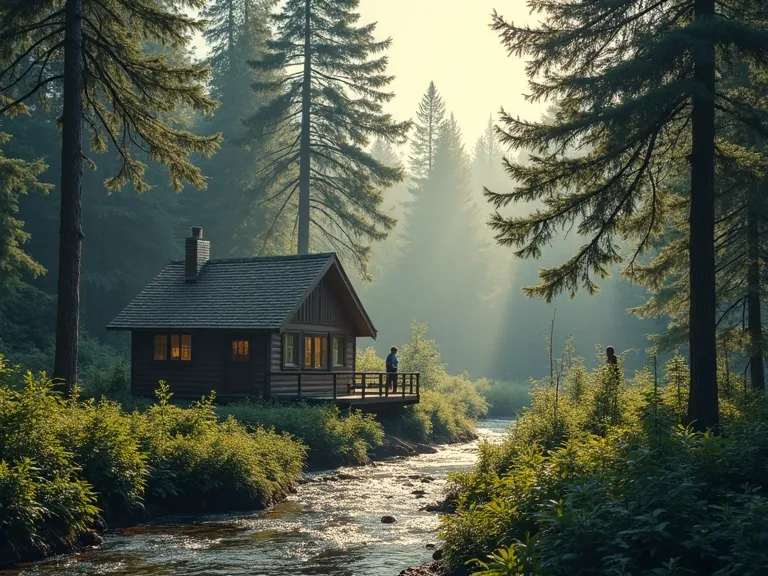In today's chaotic world, full of noise, digital notifications and the constant pursuit of success, many of us yearn for a simpler, more authentic life; we feel that something essential is slipping away from us in the daily rush, and our connection with nature and our inner selves is gradually fading away. Technology, which was supposed to make our lives easier, paradoxically complicates them, distancing us from the simplicity and harmony that we intuitively recognize as fundamental to true happiness.
Henry David Thoreau, a 19th-century philosopher and nature writer, experienced similar dilemmas, albeit in a different historical context, and found a solution in returning to the basics of existence in nature. “I went to the woods because I wanted to live deliberately,” he wrote in his groundbreaking work Walden, which continues to inspire those seeking balance, simplicity, and self-sufficiency. In this article, we will explore five timeless principles of Thoreau’s philosophy that can help us regain inner peace and harmony in a world that seems to be moving further and further away from the natural order of things.
Conscious living and simplicity
Henry David Thoreau's philosophy of conscious living is a path to finding authentic happiness by simplifying everyday life. Rejection of unnecessary material goods becomes the first step towards a deeper experience of reality, where every moment takes on intensity and meaning.
How to implement the principles of conscious living and simplicity into your daily life? Here is a step-by-step process:
- Identify the things that truly add value to your life.
- Eliminate unnecessary items and activities that consume your time and energy.
- Practice mindfulness in your daily activities.
- Spend more time in nature, observing its rhythm and harmony.
- Develop self-sufficiency by learning basic skills.
"But how can I survive in today's world without the latest gadgets and constant activity?" a skeptic might ask. The answer is simple - it is not technology and excess stimuli that give us fulfillment, but a deep experience of what is really important. Simplicity does not mean living in extreme conditions, but consciously choosing what actually enriches our existence and eliminating everything that distances us from it.
Harmony with nature and independence
Living in harmony with nature is not just a romantic idea, but a fundamental element of Henry David Thoreau’s philosophy, who in Walden showed how a deep connection with nature can lead to true inner freedom. Have you ever wondered how far we have become from the natural rhythms that have shaped human life for millennia? Returning to nature is not a step back, but a conscious decision to find balance in a world dominated by technology and rush.
Independence, as understood by Thoreau, goes far beyond material self-sufficiency. It is, above all, independence of thought and the courage to live according to one’s own convictions, even when they contradict dominant social trends. Building one’s own shelter, growing food, or drawing water from a pond every day are not ends in themselves, but means to achieving authentic spiritual and intellectual autonomy. Is it possible to find such independence today without completely withdrawing from social life?
Harmony with nature manifests itself in the rhythmic adaptation of one's life to the cycles of nature – sunrises and sunsets, the changing of the seasons, the natural processes of growth and death. This deep dialogue with the natural environment allows us to rediscover our own place in the wider ecosystem of life.. The contemporary search for a balance between technological progress and respect for the natural systems that support life on Earth is a continuation of the reflection initiated by Thoreau, showing that his vision does not lose its relevance, but rather gains a new dimension in the face of global ecological challenges.
Self-sufficiency and time for reflection
Living in the forest, far from the hustle and bustle of modern civilization, creates a unique space for developing self-sufficiency – one of the fundamental values that Henry David Thoreau valued. In his cabin on Walden Pond, the philosopher not only grew his own vegetables and built a shelter with his own hands, but above all discovered a deep truth about human nature. Self-sufficiency in his understanding went far beyond the material dimension – it was a path to inner freedom and independence of thought.
When a person satisfies his basic needs through his own efforts, there is a special moment of awakening. Hands occupied with simple work free the mind, allowing it to wander along paths previously undiscovered. The forest becomes not only a source of food and shelter, but also the greatest teacher of patience and humility. Everyday activities – collecting firewood, drawing water from a well or observing wild animals – cease to be mere duties, but become rituals connecting us with the ancient rhythm of nature.
In a world of constant rush and external stimuli, the ability to stop and delve into one's own interior is becoming a disappearing art. However, a life of simplicity and self-sufficiency creates conditions ideally conducive to reflection. The silence of the forest is not a void – it is a space filled with the subtle language of nature that speaks to those who have learned to listen. In this silence, questions arise about the essence of our existence, about the value of the material goods we accumulate, about the meaning of interpersonal bonds that we too often build on superficial foundations.
Thoreau wrote that most people live lives of “quiet desperation.” Self-sufficiency offers an alternative—a life of conscious harmony, where each day is not only lived but experienced to the fullest. When we free ourselves from the need to constantly earn money for things we don’t really need, we find space to contemplate what is truly important. Perhaps the greatest paradox of modernity is that, with more than ever before, we feel deeply unsatisfied.
Time spent reflecting in the forest is not time wasted – on the contrary, it is an investment in a deeper understanding of one’s own nature and place in the larger order of the world. In this space, we discover that true self-sufficiency does not consist in complete isolation from others, but in finding an inner source of strength that allows us to consciously choose with whom and how we want to build relationships. This is the path to authentic life, the value of which is measured not by the number of things we possess, but by the depth of our experience of each moment.
The Influence of Thoreau's Philosophy on Modern Approaches to Nature
Henry David Thoreau, a 19th-century philosopher and writer, left a legacy that resonates in surprising ways with contemporary environmental movements and individual quests for harmony with nature. His experiment in living at Walden Pond was not just a personal escapade, but a manifesto of a deeply thoughtful philosophy. Thoreau did not just describe nature – he proposed a revolution in the relationship between man and the natural environment., a revolution that is only gaining full recognition in the 21st century.
The contemporary approach to nature, inspired by Thoreau's thought, has evolved from interest, through care, to the urgent need to protect the natural environment. Minimalism, conscious consumption and the "slow life" trend are direct echoes of his calls for simplicity and conscious living. A society tired of excessive consumerism is rediscovering the value of simplicity that the philosopher wrote about. The "tiny houses" movement, the pursuit of energy self-sufficiency, organic farming - all these phenomena can be seen as practical applications of Thoreauvian philosophy.
The postulate of conscious living in harmony with the rhythms of nature became particularly important. As Thoreau wrote: "We live too fast. People think they have to do their job before they live". This idea has been reflected in the growing trend towards mindfulness, forest bathing and other forms of therapy based on contact with nature. Medicine is beginning to recognize the therapeutic value of being in the natural environment, confirming the intuitions of the philosopher from almost two centuries ago.
Thoreau’s independent thinking and critical approach to social norms became the foundation for countercultural and environmental movements. From protests against the overexploitation of natural resources to individual decisions to live more ecologically, his legacy is reflected in numerous forms of civil disobedience against destructive environmental practices. Contemporary environmental activism draws inspiration from his courage to live according to his convictions despite social pressures.
In the era of climate crisis, Thoreau’s philosophy takes on a new, urgent meaning. It is no longer just a romantic vision of life in the forest, but a practical set of guidelines for a society facing the need for a profound transformation of its relationship with the planet. His postulate of self-sufficiency inspires contemporary communities striving for sustainability and resilience to crises. Thoreau reminds us that nature is not a resource to be exploited, but a community to which we belong and to which we have moral obligations.
Forest Wisdom: Returning to the Essence of Life
Thoreau's philosophy is not just a historical curiosity, but a practical guide to the modern world. Conscious living, striving for simplicity, harmony with nature, independence, self-sufficiency and reflection create the foundation on which we can build a more authentic existence. In a world rushing towards technological complexity, simplicity becomes a revolutionary attitude. In an age of separation from nature, harmony with it offers healing.
Imagine a weekend without phones and the internet, spent in a small forest cabin. You start the morning with meditation at sunrise, pick forest fruits for breakfast, and fill the day with simple activities – reading a book in natural light, walking, and observing nature. In the evening, by candlelight, you write down your reflections in a journal. This short time can completely change your perspective, reminding you of the values that escape our attention in the daily rush.
Discover Your Forest Path
You don't have to move to the forest like Thoreau. Start small - from simplicity in complexity, from nature in technology. In harmony with nature, find harmony with yourself. Let the silence of the forest speak to your mind, and let your mind find silence in the forest.
Frequently asked questions
How to introduce the principles of Thoreau's philosophy into urban life?
Thoreau's principles, although they were created in the context of life in the forest, can be successfully adapted, even in the hustle and bustle of the city. Conscious living can be practiced through daily meditation and mindfulness. You can introduce simplicity by systematically eliminating unnecessary items and limiting consumption. Contact with nature, even through regular walks in parks or growing plants on a balcony, will help you find harmony.
Is Thoreau's philosophy of self-sufficiency realistic today?
The complete self-sufficiency that Thoreau wrote about may be hard to achieve these days. But you can gradually introduce many elements of this philosophy into your life. Start by learning basic skills, such as growing your own vegetables, repairing things instead of throwing them away, or making homemade preserves. Self-sufficiency today can also mean less reliance on technology and returning to simpler solutions.
How do we reconcile Thoreau's isolation with the need for social contact?
Thoreau, although he lived in isolation at Walden Pond for two years, did not completely reject social contact. He regularly visited the nearby town and entertained guests at his cottage. You can find a balance between time spent alone and social interaction by setting aside days or hours each week for reflection and meditation. Consciously building relationships with selected people who share your values, rather than superficial acquaintances with many people, is more in keeping with the spirit of Thoreau's philosophy.







